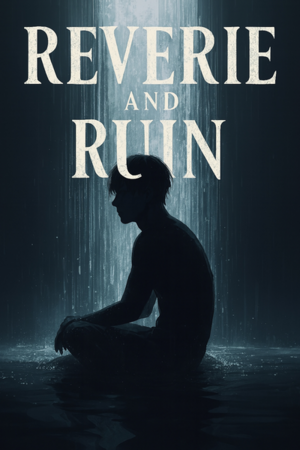Chapter 1:
The Stag, Hunted
Kumo-banaré: As Distant as the Clouds
Do you ache no longer
At the pain which afflicts us—
Us, the worldly folk?
No, not now, nor evermore.
In a far-off land—
Yea, as distant as the clouds—
Upon its foothills,
Where cold dew and mist do fall;
There you have made your dwelling.
FUJII-NO-MURAJI KOOYU,
from Book XV of the Man’yōshū
Though the leaves had yet to redden or scatter, one could already feel Autumn taking Summer’s place here by the western seas. The dew which covered the grass and the trees no longer felt refreshing—rather, it was hostile, as it bit at the skin and through clothes. The fog which spread over the forests and meadows at dawn had begun to dwindle. Over the next few moons the sun’s course would slowly continue to dip southward until it reached its nadir in the winter, heralding the coldest time of the year. But for now, after they had hearkened to nature’s signals, the creatures of this region known to its sapient inhabitants as Hi were altogether active, taking measures to prepare for the months ahead.
The deer, in particular, became an almost aggressive presence in the forests. With it being their ripe time for breeding, the bucks grew bolder in their tries to find a mate and pass on their seed. Striking out on their own, setting themselves apart from the rest of their kin, they engaged in fierce competition day and night. Their fighting, chasing, and running all about may have made them terrifying to most other life in the forest, but to the men the timing of all this could be seen as a miracle, nay, a divine boon; for it gave the hunter a chance to pile meat into his stores before winter came for him as well. On this day, it seemed the boon was ready to be claimed once again.
In search of a spot of unmarked land, one buck, even a gallant stag, stopped in his tracks. As the rays of first light danced upon his tawny fur, he lowered his head and examined the dirt with his proud snout. After a few sniffs he reached his conclusion: he had found the land he was looking for. Still hunched over, he began to scrape at this dirt with his hooves, engraving in it not only the impressions of his cleft toes, but also of his scent, sure to lure some choice doe right to him. As he would have it, however, was not as it would be.
WHSHHT!
The sound of something whizzing over his back, rustling the finest of his hairs as it passed, brought him to full attention. Turning his head toward the origin of the projectile he saw, half-concealed behind some brush, something which should not have been there: one of those hideous two-legged creatures, crest of the head full with shaggy pitch-black hair. Moreover, this one, this man, held some long shaven branch between its (he could not tell its sex) two arms, which the stag must have seen fell his kin many times over the years. He would not tarry long enough to become another example.
The stag ran, but he was not afraid. No, he knew he was one of the fastest creatures in the forest, him and all his kin. Sure enough, his ears picked up the man’s plodding footsteps, already sounding weary, as it gave chase to him. Ere long the man would grow weary and give up, returning to its vantage point and lying again in wait for its next victim. But—did his ears deceive him?—he thought now he heard the man leap. Surely it had not already come close to stumbling?
It mattered not; the stag continued to run, if only to put some distance between himself and the man. At length, after reaching a shallow brook, he stopped, hoping the man had done the same long before he did. But once again he thought his ears must have been playing tricks on him, for just after stopping he heard something pass between the trees above him. It was too heavy to be a bird, so it must have been—and looking up, it was—the man. Perched on a low arm of the tree, it held out that shaven branch it had shown before, as well as a smaller branch tipped with a stone—a stone which was pointed right at him. This was sure danger. Again he ran, but still he was unafraid. Surely he would escape.
Now that his ears had become attuned to the sound, he could hear the man bounding its way through the trees, keeping an uncannily even pace with him. And yet in the back of his mind he racked through all the times he had seen, heard, or smelled a man—not one of those times had a man been up in a tree. If running on foot was not tiring enough, then this man must have been at its limit by now. A groan from the man echoed its way across the treetops. Shortly after it stopped moving. The stag pressed on nonetheless, and good was it that he did; for the man continued to make noise, eking some guttural, rhythmic vocalizations out from its gullet. Was it trying to frighten the stag? Surely not! These noises were a poor imitation of any other creature that might feast on a deer like him.
Finally the stag was in the clear, out of range of the man and its strange calls. At length he slowed his sprint down to a trot and continued on through the woods—until he noticed the fog growing thicker around him. He stalled. Looking down at the grass, he saw the dew itself arise from the blades which it had nestled on; rising up, up past his head, past his tall antlers. From there it joined the still-thickening cloud which now fully engulfed him. He turned his head to the left, to the right, even did an about-face, searching for some opening in the mist. He did see a light—but this was not the warm glow of the sun. No, it was two small beads, twinkling and refracting in the wetness. Two small beads, the same size and shape as the man’s—
THWOK!
This time the stone-tipped branch made its mark. A lung was pierced. But still the stag did not bleat, did not cry; he could hardly fathom the pain that now made his whole body seize. He ran, took off a third time. But he did not get far; those two protrusions which adorned his head the same way the jet-black hair adorned the man’s signaled the end of the road for him, as he collided with a mighty, tall juniper. His antlers locked in its pine-covered branches, his breathing now labored, he was quickly sapped of the strength even to struggle and wrest himself free from this trap.
He gave up.
Cocking his head upward, in his last moments he caught a better glimpse of the man that had bested him as it descended from the trees. It was short, slender; its jet-black hair cut evenly at its forehead and shoulders. Its hide was largely obscured—not by its own fur, but by the pelt of another creature which it draped over its shoulders, and beneath that still cream-colored layers of strange origin. It had even marked its own face, three large red dots beneath each of its wide eyes. Compared to the stag’s natural-born beauty, this all was something hideous—an abomination, even—and yet, at the same time, it seemed no less proud, no less defiant than he; its stoic face cooly marked him for death. Looking down at its body again, he could make out something of breasts poking out beneath the frame of its cape. A woman?
THWOK!
He stopped everything.
Alas, the tawny stag! In his most vulnerable season, he dared to set himself apart from all other creatures. Even his kin, even his own flesh and blood, he had disowned, proclaiming himself for a fleeting moment the ruler of these woods. Once a common bond with all life living in the forest he had held, but in the end he was alone, with not even the blades of the grasses to answer for him; engulfed by a fog of solitude, adrift in his own cloud as his soul departed for the Land of the Root. Might men avoid such a sorrowful fate as his!




Please sign in to leave a comment.